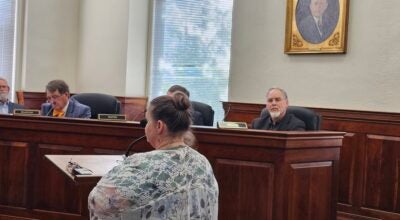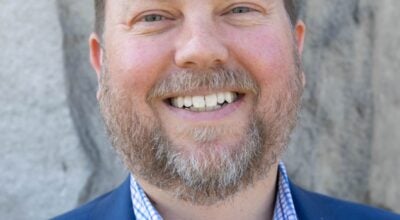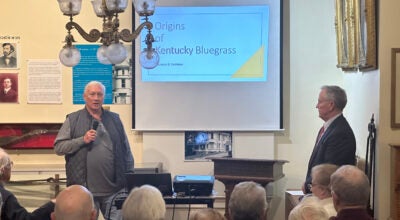Candidates tout personal qualities, views on incarceration at forum
Published 3:09 pm Wednesday, April 26, 2023
|
Getting your Trinity Audio player ready...
|
This story covers the second half of the forum held last week for the upcoming special election for the vacant seat in the 28th Senatorial District. Part one was published on Tuesday.
The latter half of the forum involving the three candidates for the state senate seat, Robert Sainte, Richard Henderson and Greg Elkins, focused on what the district missed during the last legislative session, their strengths and weaknesses and incarceration.
The third question asked of candidates is what the district missed out on during the last session and how would it be ensured that the same wouldn’t happen in the future.
Answering first, Henderson stated that valuable time was missed in becoming acclimated to information that would be gathered toward the next budget cycle. By electing him, acclimating wouldn’t need to occur, as there wouldn’t be much of a learning curve regarding speaking to the body, negotiating, and more. Thus, it would be a smoother transition. Elkins stated that some critical funding may have been missed out on as other districts might have been prioritized. However, from speaking with senators and representatives, he said he did not believe there would be an issue settling into the environment and that prior experience working with the government would be advantageous.
Sainte said that not having an active senator during the session was unfortunate, as while public gaming was expanded on devices across the state, a ban on sports games was enacted that will hurt local businesses if a present injunction does not stay permanent. Another piece of legislation passed, Sainte said, was the repeal of the barrel tax which will also have negative long-term consequences, while programs for children were missed. He noted one positive was that a bill legalizing medicinal marijuana was passed.
Next, candidates were asked how they would balance their personal views with the wants and needs of their agenda.
Elkins noted that while it could sometimes be challenging, it was necessary to remember who they were appointed to represent so seeking to gain input from constituents is essential, as is balancing their needs. Though not often, he pointed out that there were times when he had to take votes based on what his constituents wanted to vote for as opposed to his personal agenda, and deciding to do so was not in doubt.
Sainte noted that personal agendas must take a backseat to the needs of constituents to complete the job well and that ss a representative, he would make himself available once a month for discussion and further understanding and that he would be present to listen for the long haul.
Henderson noted that this hasn’t been an issue, as experience has taught him that it’s all about the people, and his energy will help dedicate him to doing so. A focus on Clark County and more, along with a passion to see others work together, would be a guiding force for him, he said.
Each candidate was asked about their strengths and weaknesses.
Sainte stated that his strengths include resilience, analysis, experience as a public servant, patience, and the ability to view issues from different perspectives and that his weaknesses included was caring more for others than personal priorities. He also acknowledged that—as the grandfather of four girls—he wants to fight for them to have the same freedoms and rights as their mothers and grandmothers.
Henderson stated that his weakness is overly talking due to his passion, though it has been harnessed, and that his strengths include Christian values such as honesty and truthfulness, passion, and knowledge.
Elkins stated that strengths include Christian values, family, loyalty, a strong work ethic, management skills and selfnesses, and he humorously noted that weaknesses include not getting through strengths before running out of time.
The final question posed asked candidates how they proposed to help counties address the burden and costs of jails.
Sharing the story of his nephew who passed away from a drug overdose, Henderson mentioned that getting a handle on substance abuse was a priority. Doing so by eliminating over-prescribing, over-promoting, and overproducing was necessary and involves holding doctors more accountable and regulating pharmaceuticals, with so many accidental addicts being created due to overreliance on medication. Aside from prescription medication, he said, stopping the spread of fentanyl is also important, though treating drug abuse was most important as it could not be prosecuted or incarcerated away.
Elkins replied that the state of Kentucky directing counties to house prisoners and telling them how, without proper funding, is uncalled for and that the state must take a more active role to avoid burdening county taxpayers. He said he favors Expanding the home incarceration program for nonviolent offenders and creating programs to reduce recidivism and focusing on rehabilitation is necessary. The former magistrate also advocated the position that prison sentences for drug sellers and other proponents must also be done to have a deterrent against others wanting to sell drugs for profit.
Sainte stated that jails are full of people who are not violent offenders but have become addicted to drugs, even taking actions to support a drug habit. He said that money from the state should be given if state prisoners are housed, and that if the jail takes on federal prisoners the jail should receive the benefit of such money. Altogether, Sainte said that the solution to the jail problem is drugs rather than the jail itself, and focusing on and providing stiff penalties to those who sell hard drugs is also essential.






